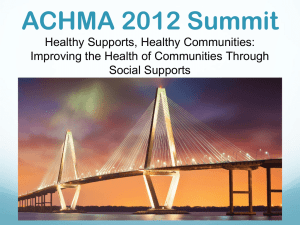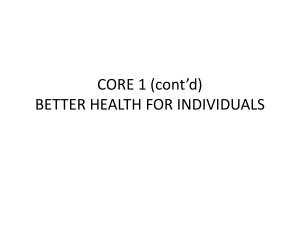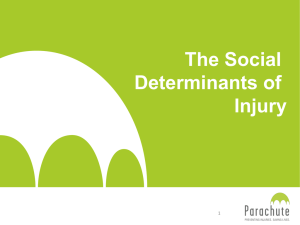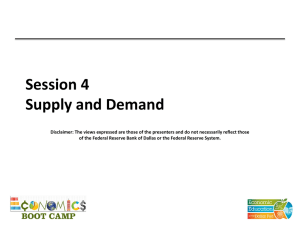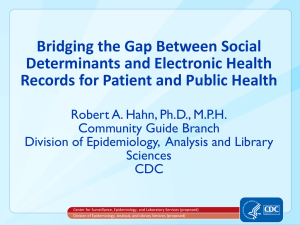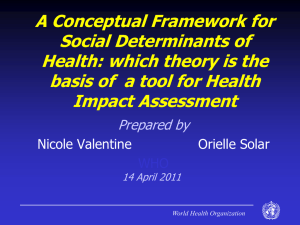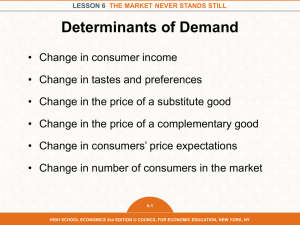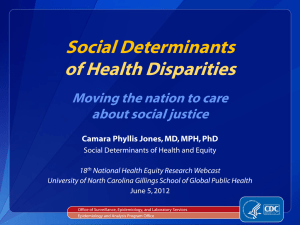Social Determinants of Health: Action to Reduce Health
advertisement
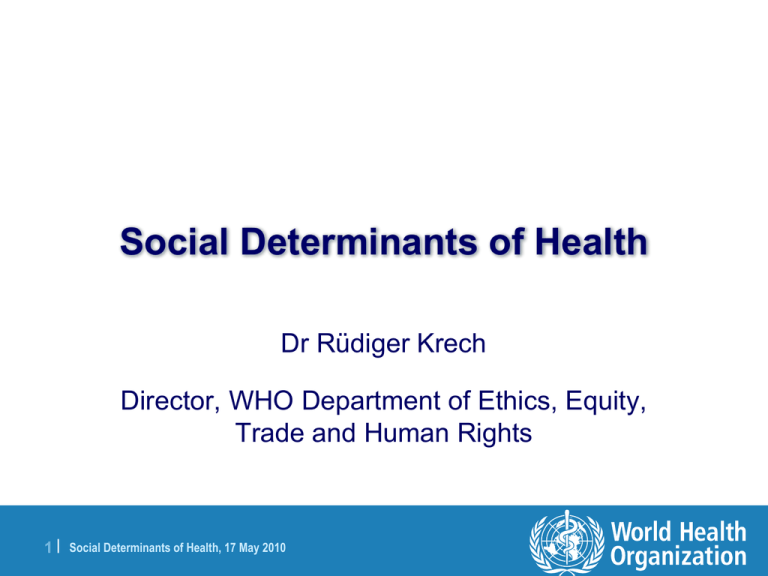
Social Determinants of Health Dr Rüdiger Krech Director, WHO Department of Ethics, Equity, Trade and Human Rights 1| Social Determinants of Health, 17 May 2010 Why treat people ... then send them back to the conditions that made them sick? 2| Social Determinants of Health, 17 May 2010 Outline What are the social determinants of health? What is WHO doing about it? How can health communicators contribute? Q&A and further discussion… 3| Social Determinants of Health, 17 May 2010 What are the social determinants of health (SDH)? The circumstances in which people are born, grow up, live, work and age, and the systems put in place to deal with illness. A girl in Lesotho is likely to live 42 years less than another in Japan. 4| Social Determinants of Health, 17 May 2010 What are inequities? The unfair, unjust and avoidable causes of ill health 5| Social Determinants of Health, 17 May 2010 What then influence the SDH and inequities? "(The) toxic combination of bad policies, economics, and politics is, in large measure responsible for the fact that a majority of people in the world do not enjoy the good health that is biologically possible,” -WHO Commission on the Social Determinants of Health 6| Social Determinants of Health, 17 May 2010 Life expectancy at birth (men) Glasgow, Scotland (deprived suburb) 54 India 61 Philippines 65 Korea 65 Lithuania 66 Poland 71 Mexico 72 Cuba 75 US 75 UK 76 Glasgow, Scotland (affluent suburb) 82 (WHO World Health Report 2006; Hanlon,P.,Walsh,D. & Whyte,B.,2006) 7| Social Determinants of Health, 17 May 2010 Outline What are the social determinants of health? What is WHO doing about it? How can health communicators contribute? Q&A and further discussion… 8| Social Determinants of Health, 17 May 2010 Commission on Social Determinants of Health 1. Improve Daily Living Conditions 2. Tackle the Inequitable Distribution of Power, Money, and Resources 3. Measure and Understand the Problem and Assess the Impact of Action. 9| Social Determinants of Health, 17 May 2010 WHO Streams of Work Intersectoral action/ “health in all policies” Addressing social determinants in public health programmes Measuring health inequities and monitoring impact of policies on inequities 11 | Social Determinants of Health, 17 May 2010 Health in All Policies “government objectives are best achieved when all sectors include health and wellbeing as a key component of policy development” -Adelaide Statement on Health in All Policies, 2010. 12 | Social Determinants of Health, 17 May 2010 Health as a resource for broader government goals Sector Interrelationships with health and well-being Economy and employment A resilient ,vibrant and innovative economy depends on a having healthy population. Healthier people are more productive, experience lower levels of absenteeism, can adapt more easily to work changes, and can remain in the workforce longer. Stable, secure employment and access to health safety nets, improves health across different social groups and workers in both informal or formal sectors of the economy, . Security and justice Security and health both depend upon the same societal conditions, including secure food, water, sanitation, housing, work opportunities, and the ability to participate in society. Health inequalities result in more violent societies with higher crime, family violence and civil unrest. Mental illness (and associated drug and alcohol problems) can be both a cause and a consequence of crime and imprisonment. Education Poor health of children or family members impedes educational attainment, reducing educational potential and abilities to solve life challenges and pursue opportunities. Schools are an optimal setting for health promotion, such as nutrition initiatives. Evidence shows that when children receive a meal at school, attendance and matriculation increases. Agriculture and the food industry Consideration of health and well-being in production, manufacturing and marketing promotes consumer confidence, a more sustainable market, and enables innovation and growth. Healthy and accessible foods are critical for health and growth across the lifespan. Supportive economic and social policy for farming communities enhances their health and well-being. 13 | Social Determinants of Health, 17 May 2010 Health sector responsibilities Understanding the political agendas and administrative imperatives of other sectors; Building the evidence base of policy options and strategies; Assessing comparative health consequences of options within the policy development process; Creating regular platforms for dialogue and problem solving with other sectors; Evaluating the effectiveness of intersectoral work and integrated policy-making. 14 | Social Determinants of Health, 17 May 2010 SDH within health programs Few global targets (e.g. MDGs) will be met without addressing social determinants A social determinants approach mean moving out of comfort-zones to work across sectors Communication of programmes should focus on supporting a critical public policy dialogue Equity is a matter of how resources [and power] are distributed - all programmes and societies can afford to be more equitable. 15 | Social Determinants of Health, 17 May 2010 Global Plan: Tb eliminated by 2050 Current trend (0.5%) extrapolated 1000 Global Plan prediction: incidence falls 5-6% per year 100 10 Desired trend Elimination target: 1 / million / year by 2050 1990 16 | 2000 2010 Social Determinants of Health, 17 May 2010 2020 2030 2040 1 2050 Incidence/million/yr 10000 17 | Social Determinants of Health, 17 May 2010 Adherers Participants Total reached Target Population Total Population PH programmes need to address the SDH and health equity Beneficiaries Social determinants in health programmes: framework for analysis Organized the work along a common framework Three phases – Analysis – Interventions and implications – Measurement 18 | Social Determinants of Health, 17 May 2010 Outline What are the social determinants of health? What is WHO doing about it? How can health communicators contribute? Q&A and further discussion… 19 | Social Determinants of Health, 17 May 2010 How does communication affect SDH? Discovers and reports the “causes of the causes” Holds bureaucrats and policy/makers accountable for equitable outcomes Is a platform for civil society voice 20 | Social Determinants of Health, 17 May 2010 Questions for health bureaucrats and policy/makers How are you living up to your responsibility to address broader social issues? Does this programme/policy combine equity, effectiveness and efficiency goals? What is your plan to increase equity despite fiscal constraint? 21 | Social Determinants of Health, 17 May 2010 Outline What are the social determinants of health? What is WHO doing about it? How can health communicators contribute? Q&A and further discussion… 22 | Social Determinants of Health, 17 May 2010 Conclusion The majority of factors that contribute to ill health and health inequities lie outside the traditional mandate of the health sector The social determinants of health must be considered within health programmes and across government policies in order to reach broader societal Policy-makers and bureaucrats must be held accountable for reducing health inequities 23 | Social Determinants of Health, 17 May 2010
